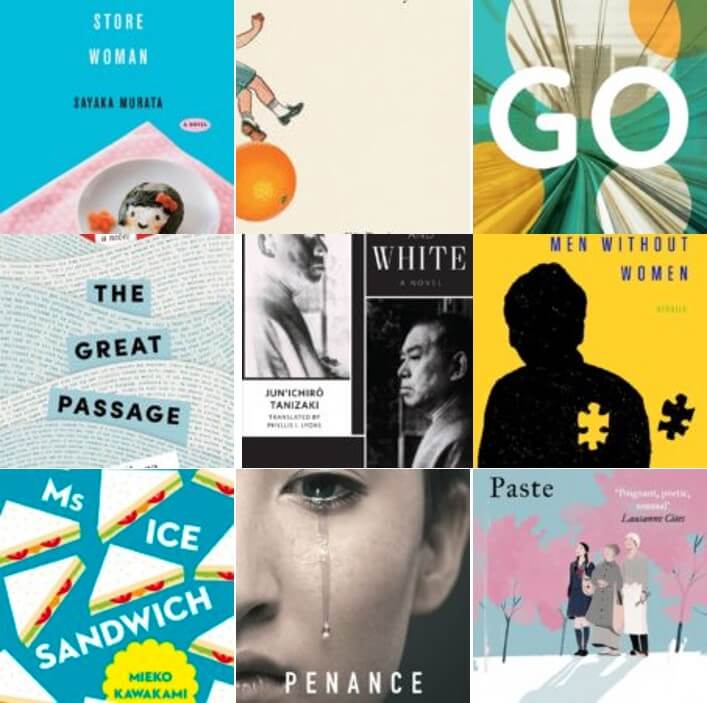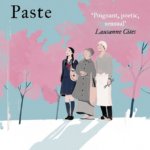22 May / Anglophoned Fiction Favorites [in Global Literature in Libraries Initiative’s “Japan in Translation” series]

 My two unfinished almost-ABD-PhDs still makes my mother cringe. I know, I know: even in middle age, my tiger mother looms, not to mention I still have occasional nightmares about missing seminar with my beloved, last advisor. His passing remains my excuse for academic desertion, but my admiration for Japanese novels, initiated and inspired by the literary titan he was, has never wavered.
My two unfinished almost-ABD-PhDs still makes my mother cringe. I know, I know: even in middle age, my tiger mother looms, not to mention I still have occasional nightmares about missing seminar with my beloved, last advisor. His passing remains my excuse for academic desertion, but my admiration for Japanese novels, initiated and inspired by the literary titan he was, has never wavered.
Since I can’t read in the original anymore (oh, how the brain has dulled), I couldn’t be more grateful for the translators (so many of them who shared our advisor!) who enable by literary obsessions. So allow me to share some of my most recent Anglophoned favorites.
 Convenience Store Woman by Sayaka Murata, translated by Ginny Tapley Takemori
Convenience Store Woman by Sayaka Murata, translated by Ginny Tapley Takemori
Despite having “a normal family,” Keiko “was a rather strange child” who learned quiet detachment to avoid trouble. At 18, she’s “reborn as a convenience store worker” at a newly opened Smile Mart. Donning a uniform, learning the manual, and mimicking her coworkers enable Keiko to become “a normal cog in society.” Eighteen years later, she remains a top-performing employee. At 36, however, being a single woman in a dead-end job elicits worry and judgment from family and acquaintances. To deflect unwanted meddling, Keiko “adopts” an arrogant wastrel with both comical and bittersweet results. The prestigious Akutagawa Prize-winning Murata, herself a part-time “convenience store woman,” makes a dazzling English-language debut in a crisp translation by Ginny Tapley Takemori, rich in scathingly entertaining observations on identity, perspective, and the suffocating hypocrisy of “normal” society.
 The Emissary by Yoko Tawada, translated by Margaret Mitsutani
The Emissary by Yoko Tawada, translated by Margaret Mitsutani
Japanese-born, Germany-based Tawada writes facilely in both languages and creates incomparable award-winning fiction that defies easy labels. Her latest literary, linguistic mélange – smoothly rendered by Margaret Mitsutani – blends fairy tale, dystopian warning, peculiar mystery, cultural critique, and multigenerational family saga. Yoshiro and Mumei are a symbiotically bonded duo who are a century apart in age. At almost 108, Yoshiro still jogs every morning for half an hour – with a rented dog. His reason for (still) living is Mumei, his daughter’s son’s son – to get him up, dressed, mandarin-juiced, out the door to practice walking a few steps, then biked the rest of the way to his elementary school. In this alternate future, everything – soil, sky, oceans – is potentially poisoned, most animals have disappeared, and even the children face extinction. Only the elderly seems to have long, long life – perhaps more curse than blessing as they bear the responsibility for being guardians to fragile, weakened new generations unprepared for survival. And yet despite his seemingly truncated prognosis, Mumei’s outlook remains full of insight and charm.
 GO by Kazuki Kaneshiro, translated by Takami Nieda
GO by Kazuki Kaneshiro, translated by Takami Nieda
Japan and Korea’s centuries-long, combative history has long made Koreans in Japan second-class citizens. Kaneshiro, who is Korean Japanese, channels his own experiences into his teenage protagonist, Sugihara, a Japan-born-and-raised ethnic Korean. After attending Korean-only schools, Sugihara transfers into a Japanese high school; three years later, he’s still plagued with violent rejection. And then he meets a girl, and the deeper their love, the harder it becomes to reveal his secret. First published in Japan in 2000 and awarded the Naoki Prize, GO also found substantial celluloid success in 2001. The title is a homophone in Japanese for language, an honorific prefix, the number five, the strategic game, and more; these multiple meanings constitute a pointed reminder of the complexity of people, relationships, and identity. Supported by a PEN/Heim Translation Fund Grant, Takami Nieda provides gratifying anglophone access to Kaneshiro’s searing ruminations – heightened by Malcolm X and Bruce Lee, softened by Miles Davis and Brahms – on history, xenophobia, and, of course, love.
 The Great Passage by Shion Miura, translated by Juliet Winters Carpenter
The Great Passage by Shion Miura, translated by Juliet Winters Carpenter
At 27, Majime is recruited to help compile The Great Passage, an überdictionary destined to guide users across a vast sea of words. The socially awkward logophile embarks on an almost two-decade journey, during which he comes to understand the deepest meanings of friendship, dedication, and everlasting love. For English readers, this Japanese bestseller arrives in the U.S. as a symbiotic accomplishment. Miura provides the whimsical original, while Juliet Winters Carpenter creates an exceptional English rendering in what was surely a supremely challenging feat of translation, further magnified by the story’s exactness of every word. In decoding the Japanese – a language already complicated by the possibilities of multilayered wordplay – Carpenter had to meticulously balance between transcribing word-for-word and providing too much linguistic context and/or cultural description, which would have dampened the ineffable cleverness of the original. Swirling with witty enchantment, The Great Passage proves to be, well, utterly great.
 In Black and White by Jun’ichirō Tanizaki, translated by Phyllis I. Lyons
In Black and White by Jun’ichirō Tanizaki, translated by Phyllis I. Lyons
“[W]e can’t distinguish what is the truthful artist and what is the lying social man.” For Tanizaki’s protagonist, the writer Mizuno, creating fiction using real-life details – he models a murder victim on a casual acquaintance, even inadvertently slipping in the man’s actual name – might just prove fatal. Mizuno plots a murder so convincingly on the page that its possibility seems imminent, and he must find any means possible (including faking gonorrhea, saving himself via sequel, betraying a secret pact with the mysterious Fräulein Hindenberg) to proactively create an alibi before a random, ardent reader turns deadly. Originally published in 1928 as a newspaper serial, this rare work by legendary Tanizaki (1886–1965) has never been available in Japan as an independent volume, only in anthologies. Japanese scholarn Miura, translated , Juliet Winters Carpenter and professor Phyllis I. Lyons not only provides the first-ever English translation 80 years later, but also includes an illuminating afterword in which she contextualizes the virtually forgotten work as both literary history and a career-changing accomplishment for one of Japan’s most revered authors. New generations of readers will undoubtedly benefit from Lyons’ careful resurrection of this surprisingly timeless, slyly metafictional, unusually intriguing title.
 Men Without Women: Stories by Haruki Murakami, translated by Philip Gabriel and Ted Goossen
Men Without Women: Stories by Haruki Murakami, translated by Philip Gabriel and Ted Goossen
For Haruki Murakami aficionados, reading Men Without Women, Murakami’s 20th book to be translated into English, is a whimsical delight. The seven stories in his fourth story collection present another captivating treasure hunt of familiar Murakami motifs – including cats, jazz, whiskey, certain cigarettes, the moon, baseball, never-named characters, and – of course – the many men without women. Two of Murakami’s regular translators (because he has them) effortlessly enable his prose for Anglophone groupies: Philip Gabriel, who most recently translated Colorless Tsukuru and His Years of Pilgrimage, and Ted Goossen, Murakami’s newest polyglot, who translated The Strange Library. Their seamless partnership is unmistakable. Who translates which story remains unknown until story’s end when a name is revealed. Despite so much seeming to be the same, rather than familiarity breeding contempt, Murakami always manages to entertain, surprise, and satisfy. If Murakami is in the (repeating) details, then such details are what make his writing so identifiably unique. “Maybe working on the little things as dutifully and honestly as we can,” a character muses, “is how we stay sane when the world is falling apart.” Sanity might be overrated, but Murakami surely is not.
 Ms Ice Sandwich by Mieko Kawakami, translated by Louise Heal Kawai
Ms Ice Sandwich by Mieko Kawakami, translated by Louise Heal Kawai
Fourth grader he may be, but our narrator is quite the sharp observer of his surroundings. His father is dead; his mother runs a “fortune-telling and that kind of stuff” salon. She’s often the recipient of his unguarded bluntness: “If video games make you stupid, then what do mobile phones make you?” The pair live with his paternal grandma who, despite her silent immobility, is his closest companion. Family aside, the eponymous Ms Ice Sandwich is the one person who gives him “that feeling you get when you swallow rice without chewing it properly first” – and that’s a good thing. Naming her for her position behind the sandwich counter at the local store, he can contentedly stare at her “great big eyes” enhanced by her “ice-blue eyelids.” And then he overhears three girls in his class dismiss his beloved as “such a freak,” triggering unexpected, disturbing reactions that require a rebalance of his young life. Japan-based Louise Heal Kawai translates Mieko Kawakami’s whimsical novella into British English as part of the London-based indie Pushkin Press’s Japanese novella series. Described as Haruki Murakami’s “favorite young novelist,” Kawakami is destined to charm Anglophone audiences as well.
 Penance by Kanae Minato, translated by Philip Gabriel
Penance by Kanae Minato, translated by Philip Gabriel
Kanae Minato is two for two for twisted psychological Japanese noir. What she did with deadly milk cartons in Confessions made quite the debut splash. She goes back to school in Penance (expertly rendered into English by lauded translator Philip Gabriel) in which 10-year-old Emily is raped and murdered on school grounds. The four friends who find her corpse are expectedly traumatized – but three years later, any semblance of recovery is irreparably destroyed when Emily’s mother invites the quartet for tea and fancy cakes, only to threaten the girls: find Emily’s murderer before the 15-year-statute of limitations or risk revenge – “I’ll make you suffer far worse than Emily ever did.” Twelve years pass, the 15-year expiry looms, and the girls – now young women – reveal the horrifying penance they’ve each performed.
 Sweet Bean Paste by Durian Sukegawa, translated by Alison Watts
Sweet Bean Paste by Durian Sukegawa, translated by Alison Watts
Making and selling dorayaki – a pancake-like pastry filled with the eponymous “sweet bean paste” – was not supposed to define Sentaro’s life. His someday-dreams of becoming a writer got waylaid by bad decisions that resulted in a two-year prison sentence. Since getting out, he’s been repaying his debts as the dorayaki shop’s only employee – until 76-year-old Tokue answers the “Help Wanted” notice. Sentaro’s initial protestations disappear after he tastes Tokue’s homemade sweet bean paste, and she quickly becomes the shop’s best asset. But Tokue has a secret past – which eventually causes her to quit, but not before customers are scared away by their own unfounded fears of her appearance. Tokue’s got to keep teaching Sentaro important lessons about listening and learning before it’s too late. Inspired by the 1996 repeal of Japanese legislation that for more than a century inhumanely confined patients with Hansen’s Disease (leprosy) – and their families, Sukegawa – enabled by Alison Watts’s lucid translation – tells an endearing, thoughtful tale about relationships and the everyday meaning of life.
Published: “Aglophoned Fiction Favorites, Part 1,” May GLLI Blog Series: Japan in Translation, No. 12, Global Literature in Libraries Initiative, May 14, 2018 and “Aglophoned Fiction Favorites, Part 2,” May GLLI Blog Series: Japan in Translation, No. 13, Global Literature in Libraries Initiative, May 15, 2018
Readers: Young Adult, Adult
